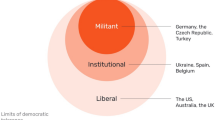Abstract
Explaining the existence and stability of democracies pose difficulties for the Public Choice-paradigm. The article argues that these difficulties may be resolved by focusing on the insurance-aspect of democratic decision-making procedures. Democratic regimes may be better able than autocratic regimes to provide the inhabitants with insurance against the risk of being subjected to arbitrary suppression from the ruling elite. This propensity of democratic regimes may explain the origin, as well as stability, of such regimes.
Similar content being viewed by others
References
Anderson, G.M. and Boettke, P.J. (1993). Perestroika and public choice: The economics of autocratic succession in a rent-seeking society. Public Choice 75: 101–118.
Anderson, J. and Hall, S. (1986). Absolutism and other ancestors. In J. Anderson (Ed.), The rise of the modern state. Brighton: Harvester Press.
Banks, J.S. (1991). Signalling games in political science. Chur, Switzerland: Harwood Academic Publishers.
Bishop, J.A., Formby, J.P. and Smith, W.J. (1991). Incomplete information, income redistribution and risk averse median voter behavior. Public Choice 68: 41–55.
Brennan, G. and Lomasky, L. (1993). Democracy & decision. Cambridge: Cambridge University Press.
Dahl, R.A. (1971). Polyarchy. New Haven: Yale University Press.
Diamond, L., Lipset, S.M. and Linz, J. (1987). Building and sustaining democratic government in developing countries: Some tentative findings. World Affairs 150(1): 5–19.
Diamond, L. (1991). Economic development and democracy reconsidered. American Behavioral Scientist 35(4/5): 450–499.
Downs, A. (1957). An economic theory of democracy. New York: Harper and Row.
Elias, N. (1982). Power and civility, vol II. New York: Pantheon Books.
Elster, J. (1988). Introduction. In J. Elster and R. Slagstad (Eds.), Constitutionalism and democracy. Cambridge: Cambridge University Press.
Fukuyama, F. (1992). The end of history and the last man. New York: The Free Press.
Hobbes, T. (1991). Leviathan. Cambridge: Cambridge University Press.
Holmes, S. (1988). Precommitment and the paradox of democracy. In J. Elster and R. Slagstad (Eds.), Constitutionalism and democracy. Cambridge: Cambridge University Press.
Kaufmann, R.R. (1987). Liberalization and democratization in South America: Perspectives from the 1970s. In G. O'Donnell, P. Schmitter and L. Whitehead (Eds.), Transitions from authoritarian rule. Comparative perspectives. Baltimore: The Johns Hopkins University Press.
Kriele, M. (1981). Einführung in die Staatslehre. Die geschichtlichen Legitimitätsgrundlagen des demokratischen Verfassungsstaates. Wiesbaden: Westdeutscher Verlag.
Kuhn, T.S. (1970). The structure of scientific revolutions. Chicago: Chicago University Press.
Ledyard, J.O. (1984). The pure theory of large two-candidate elections. Public Choice 44: 7–41.
Lijphart, A. (1977). Democracy in plural societies. New Haven and London: Yale University Press.
Linz, J.J. and Stephan, A. (1978). The breakdown of democratic regimes. Baltimore: The Johns Hopkins University Press.
Lipset, S.M. (1981). Political man. Baltimore: The Johns Hopkins University Press.
Lipset, S.M., Seong, K.R. and Torres, J.C. (1993). A comparative analysis of the social requisites of democracy. International Social Science Journal 136: 155–176.
Locke, J. (1993). Two treasties of government. London: Everyman.
Lowenthal, A.F. (Ed.) (1991). Exporting democracy. The United States and Latin America. Baltimore: The Johns Hopkins University Press.
Machiavelli, N. (1983). The prince. Harmondsworth: Penguin Books.
Montesquieu, C. (1989). The spirit of the laws. Cambridge: Cambridge University Press.
Moore, B. (1966). Social origins of dictatorship and democracy: Lord and peasant in the making of the modern world. Boston: Beacon Press.
O'Donnell, G. and Schmitter, P. (1986). Transitions from authoritarian rule. Tentative conclusions about uncertain democracies. Baltimore: The Johns Hopkins University Press.
Overbye, E. (1995). Making a case for the rational, self-regarding, "ethical" voter ... and solving the "Paradox of Not Voting" in the process. European Journal of Political Science 27: 369–396.
Przeworski, A. (1988). Some problems in the study of the transition to democracy. In G. O'Donnell, P.C. Schmitter and L. Whitehead (Eds.), Transitions from authoritarian rule. Baltimore: The Johns Hopkins University Press.
Rasmusen, E. (1991). Games and information. Oxford: Basil Blackwell.
Rokkan, S. (1975). Dimensions of state-formation and citizenship. A possible paradigm for research on variations within Europe. In C. Tilly (Ed.). The formation of nation-states in Europe. Princeton: Princeton University Press.
Schumpeter, J.A. (1942). Capitalism, socialism and democracy. New York: Harper and Row.
Shepsle, K.A. and Weingast, B.R. (1981). Structure-induced equilibrium and legislative choice. Public Choice 37(3): 503–519.
Speer, A. (1971). Inside the Third Reich. London: Sphere Books.
Stephan, A. (1986). Paths toward redemocratization: Theoretical and comparative considerations. In G. O'Donnell, P. Schmitter and L. Whitehead (Eds.), Transitions from authoritarian rule. Comparative perspectives. Baltimore: The Johns Hopkins University Press.
Stephens, J.D. (1989). Democratic transition and breakdown in Western Europe 1870–1939: A test of the Moore thesis. American Journal of Sociology 94(5): 1019–1077.
Tullock, G. (1981). Why so much stability? Public Choice 37(2): 189–202.
Tullock, G. (1983). Economics of income redistribution. Boston: Kluwer Nijhoff Publishing.
Tullock, G. (1987). Autocracy. Boston: Kluwer Academic Publishers.
Whitehead, L. (1986). International aspects of democratization. In G. O'Donnell, P. Schmitter and L. Whitehead (Eds.), Transitions from authoritarian rule, Comparative perspectives. Baltimore: The Johns Hopkins University Press.
Wilson, R. (1985). Reputations in games and markets. In A.E. Roth (Ed.), Game-theoretic models of bargaining. Cambridge: Cambridge University Press.
Author information
Authors and Affiliations
Additional information
Thanks to Bard-Anders Andreassen, Erling Barth and an anonymous referee for valuable comments to an earlier draft.
Rights and permissions
About this article
Cite this article
Overbye, E. Democracy as insurance. Public Choice 87, 319–345 (1996). https://doi.org/10.1007/BF00118652
Accepted:
Issue Date:
DOI: https://doi.org/10.1007/BF00118652




